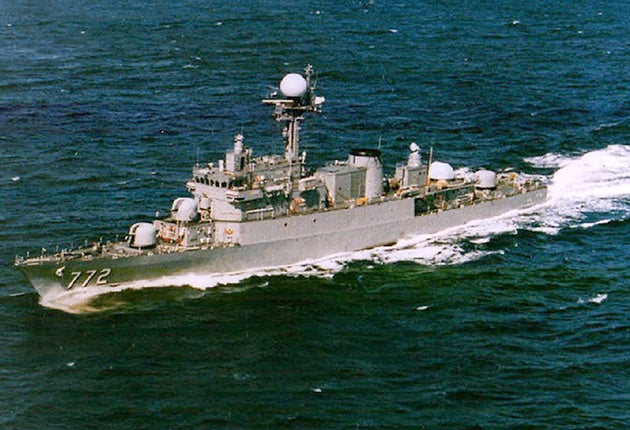Warship mystery raises Korean tensions
Seoul says it is not clear whether North Korean torpedo sank vessel

A ship of the South Korean navy sank yesterday near the country's disputed maritime border with North Korea. Many of the crew of more than 100 were feared dead after what was initially described as a suspected torpedo attack by North Korean forces.
Fifty-eight personnel from the 1,200-tonne corvette Cheonan were rescued by other navy and coastguard vessels after an explosion capsized the patrol boat near Baengnyeong island, off the west coast of North Korea, at about 9.45pm. Officials in Seoul said they were expecting a large number of casualties, with many sailors still missing as water temperatures fell.
Following initial reports of a torpedo attack, a spokeswoman for President Lee Myung-bak tried to calm fears, saying: "It is premature to discuss the cause of this sinking. It is not clear whether North Korea was involved."
Earlier in the day, North Korea's military had threatened "unpredictable strikes", including a nuclear attack, in anger over reports that South Korea and the US were preparing for possible instability in the communist North. Fears of a military conflict that could draw in America, which has 28,500 troops stationed in South Korea, sent jitters around the world's stock markets, and was cited as one reason for a dip in share values on Wall Street.
The incident also threatened to take the shine off the announcement of an agreement between the US President, Barack Obama, and his Russian counterpart, Dmitry Medvedev, to drastically scale back their nuclear arsenals. The pact, described by Mr Obama as leading towards "the peace and security of a world without nuclear weapons", is expected to give a boost to efforts to halt North Korea's nuclear programme, which have been stalled for months. Government officials in Washington said last night they were waiting for more information on what happened and did not want to inflame the situation. The US force stationed in South Korea has been put on a heightened security state.
The sinking of the Cheonan in the Yellow Sea, the site of three bloody naval clashes between the warring Koreas, was followed by reports that another South Korean vessel had opened fire on an unidentified target in the direction of North Korea. However, the defence ministry later said that the target picked up on the radar might have been a flock of birds.
President Lee convened an emergency meeting of security officials in Seoul, putting on standby police in the capital and troops at the border. North Korea had declared that it was bolstering its defences in response to a joint South Korean-US military exercise last month – a drill that the regime in Pyongyang called "undisguised adventurous sabre-rattling which is creating such a tense situation that a war may break out any time".
North Korea subsequently declared four areas in the disputed sea border would be considered "military free-fire zones". South Korea, in turn, deployed rocket-launchers to the region, and a brief exchange of fire took place without any deaths or injuries.
William Petersen, a US strategic analyst on South-east Asian issues, said: "North Korean involvement in the sinking would have extremely serious and damaging consequences. We'll have to wait and see what transpires.
"There has been a scaling up of tension between the North and the South and that is partly because of the uncertainty surrounding [the North Korean leader] Kim Jong-Il, who is certainly not well. There are various factions around him jockeying to position themselves for what happens after his departure, and it may be in the interest of one of these factions to engineer a confrontation."
The two Koreas are still technically at war because no peace treaty was signed after the 1950-53 war. The continuing ill health of Mr Kim has also caused friction, with the North accusing the US and the South of plotting a coup.
Pyongyang said that planned talks between America, South Korea and China to prepare for a possible emergency following Mr Kim's death – as well as a report supposedly commissioned on the matter by Washington – were "desperate moves of the imperialists and the South Korean puppet war-mongers" for regime change.
North Korea's military said its defences were an "impregnable fortress" and hopes of the regime collapsing were "a pipe dream of a lunatic wishing for the sky to fall". It added: "Those who seek to bring down the system, whether they play a main role or passive role, will fall victim to the nuclear strikes of an invincible army."
Join our commenting forum
Join thought-provoking conversations, follow other Independent readers and see their replies
Comments